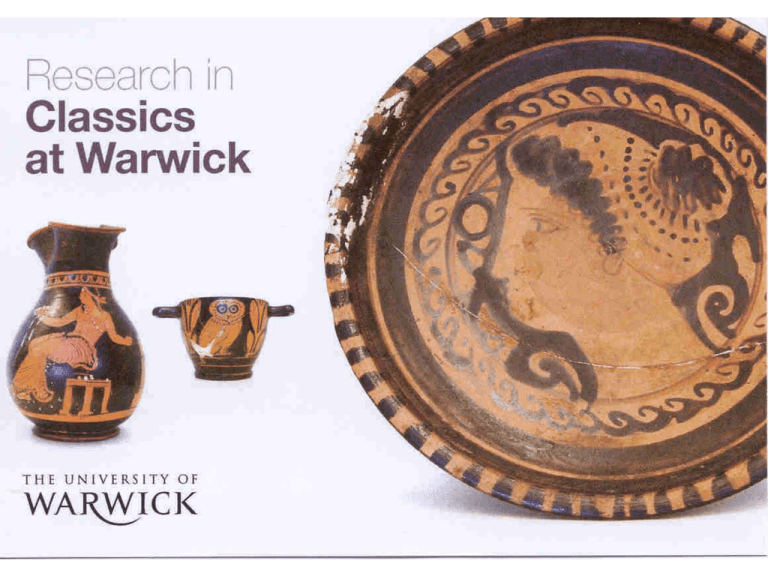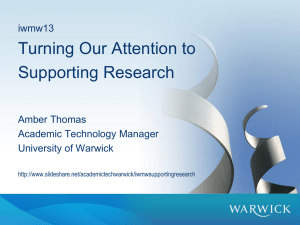Document 12390050
advertisement

Degree Courses • Research Degrees • MA (40,000 words) 1 yr f-t, 2 yrs p-t • MPhil (60,000 words) 2 yrs f-t, 4 yrs p-t • PhD (80,000 words) 3-4 yrs f-t, 5-7 yrs p-t (fees payable for 3/5 years but registration runs for 4/7) MPhil/PhD • 80,000 words over 3-4 years • Departmental and Faculty wide training and induction programmes • CADRE support • Postgraduate Conference in Summer term To satisfy the requirements for the degree of PhD, a thesis shall constitute a substantial original contribution to knowledge which is, in principle, worthy of peer-reviewed publication. The thesis shall be clearly and concisely written, well argued, and shall show a satisfactory knowledge of both primary and secondary sources. In addition, it shall contain a full bibliography and, where appropriate, a description of methods and techniques used in the research. The thesis shall not exceed 80,000 words, exclusive of appendices, footnotes, tables and bibliography. Warwick’s areas of expertise • • • • • • • • • • • • • ART, ARCHAEOLOGY, EPIGRAPHY AND NUMISMATICS (Zahra Newby, Alison Cooley, Suzanne Frey-Kupper, Kevin Butcher, Michael Scott) LATIN LITERATURE AND ITS RECEPTION (Andrew Laird, Vicky Rimell) GREEK LITERATURE AND THEATRE (David Fearn, Emmaneula Bakola) RENAISSANCE RECEPTIONS (Andrew Laird, Maude Vanhaelen) GREEK HISTORY (James Davidson, Michael Scott) ROMAN HISTORY (Alison Cooley, Kevin Butcher, Zahra Newby) SEXUALITY AND GENDER (James Davidson) ANCIENT MEDICINE (Caroline Petit) ANCIENT PHYSIOGNOMY (Simon Swain) ANCIENT ATHLETICS AND FESTIVAL CULTURE (Zahra Newby, David Fearn, Michael Scott) EASTERN MEDITERRANEAN (Simon Swain, Zahra Newby, Kevin Butcher) SECOND SOPHISTIC LITERATURE AND CULTURE (Andrew Laird, Zahra Newby, Simon Swain) Find out More: Warwick’s Research Culture • Ranked 8th in the UK in the most recent Research Excellence Framework. 80% of our research was rated as 4* (world-leading) or 3* (internationally excellent). • Staff who are active researchers and leading scholars in their fields • Weekly Research seminars • Interdisciplinary focus with links with Italian, History of Art, Renaissance Studies, 18th Century Studies • Annual Postgraduate conference • 100% satisfaction rate with supervision in the Department in the recent PG Research experience survey. • Support of the Humanities Research Centre and CADRE Some Current Areas of Research The Cult of Asclepius The Roman Concept of the Patria (AHRC funded) Classics in 18th Century Paraguay (Warwick International Scholarship) Literacy in Roman and Post-Roman Britain (AHRC funded) Cults and Religious Identity in Ancient Boeotia (Dept Scholarship) Coin circulation in Central Italy in the Late republican period (Wolfson Fellowship) Roman imperialism in the time of Hadrian A commented edition of Antoine Garissoles' Adolphid’. Defining a Late Antique Aesthetic in Art and Text. (Wolfson Fellowship) Colour in Greek and Roman Art (Dept fees award) Roman Sicily and the Transition from Republic to Empire The Meanings of Humanitas (CADRE Scholarship) Redefining the category of apotropaiac images (Wolfson Fellowship) Written on the body: epigraphy and Greek sculpture Material responses to ancient tyranny Entry Requirements • MPhil/PhD: a very high 2-1 or 1st in ug degree + merit or distinction at Masters level • A solid and well-thought through proposal which identifies an original area for research • For non-native English speakers, certification at level BAND B Deadlines and Funding • No fixed deadline until end July, but prefer applications by end April • University Scholarships deadline: 13th January 2016 (includes CADRE, Wolfson and Chancellor’s International Scholarships) • Departmental Awards: Deadline: 11th March 2016 One PhD 3-year fees and maintenance scholarship + several 1-year fees-only awards: Apply by email to z.l.newby@warwick.ac.uk with covering letter stating your financial position. How to apply • http://www2.warwick.ac.uk/study/postgrad uate/apply/process • Best to apply on-line • Remember to send references and transcripts asap to avoid delays • Deadline for supporting documents for Scholarship Applications is 20th January 2016. How to write a PhD proposal • • • • • Be clear, make all your words count, and tailor them to any instructions Think about your research questions and academic context Outline how your project is a good ‘fit’ for the department/University Consult with your potential supervisor, seek second opinions, read it through If you are also seeking funding, think about your future plans Think about your audience • Will what you propose be clear to a nonspecialist? • What is new or important about your approach? • Is your methodology comprehensible and viable? • Have you discussed your sources and how you will use them? • How does your project fit into the wider literature/ broader context/ academic trends? Applying for Funding • http://www2.warwick.ac.uk/services/academicoffice/gsp/ scholarship • (contains information on other sources of funding, as well as University competitions) • Apply online on the application form • Section 9: Finance: Under ‘how will you fund your studies’, select ‘Scholarship/Studentship’ This will being up a box asking if you wish to be considered for a PG research scholarship. Select ‘Yes’ • A new box will pop up: only the information here, your references and your transcripts will be seen by the assessors. Scholarships Section • Details of scholarships / prizes applicant has been awarded in the past: • Applicant’s Research Proposal and ability to complete it (maximum 4500 characters, approx. 720 words) • Applicant’s Publications details: Supporting Documents • Two academic references • MUST discuss your ability to complete the research, your skills, your research topic, and why you are worthy of funding • MUST be uploaded by 20th Jan at the LATEST: try to get them to do it earlier, and keep reminding them! • Official academic transcripts for both UG and MA degrees: • MUST include all grades for individual modules, not just overall degree result. Available from institutions or use ‘HEAR’ report. The Warwick application form and scoring criteria • The only part of the application which is read by the Faculty scorers (no attachments count) • 50% of the score is based on previous academic performance, be specific • 30% on the strength of the research proposal, referees’ reports etc • 20% on other academic or relevant activities e.g. scholarships, grants, prizes, publications… Other possibilities for selffunding • Check website for other sources of funding http://www2.warwick.ac.uk/services/acade micoffice/gsp/scholarship/typesoffunding/ • http://www2.warwick.ac.uk/services/acade micoffice/gsp/scholarship/apply/fundingwit houtfunding • Join the residential life team • Apply for career development loan • Study part-time




